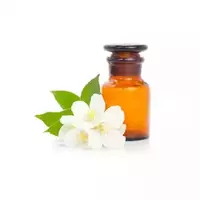Jasmine oil

The plant with the pleasant name jasmine appears before us as a shrub with attractive lush clusters of milk-white flowers, which are inherent in a deep honey-flower aroma. Jasmine flowers contain a considerable amount of essential oil, which has not only a subtle aroma, but also a lot of unique medicinal properties.
Even ancient healers and healers used flowers and jasmine oil in medical practice. For example, in India, dried raw materials were crushed into powder, and then eaten in the presence of various skin diseases. For residents of China, jasmine is still the main component of medicinal coughing syrup, as well as a mandatory attribute of a tea ceremony.
In general, tea with the addition of flowers or jasmine oil helps to relieve stress and increase the body's tone, while thanks to the multifaceted unique aroma of this plant, the mood simply rises. However, in a poorly ventilated room, a rich jasmine aroma can cause dizziness, headache and nausea, so you should definitely not abuse it.
For medical, perfume and culinary purposes, jasmine is actively cultivated in countries such as Egypt, India, Italy, Morocco and France. Two types of flavors can be obtained from jasmine flowers: absolute jasmine oil (absolute) and jasmine oil concret.
The first type is a rather viscous dark yellow or red-brown liquid with a rich smell of flowers, which will dissolve in organic solvents, 90% ethanol, but is completely insoluble in water. Jasmine oil concret is a waxy mass of the same shades and with a strong characteristic smell of flowers.
Undoubtedly, the production of jasmine essential oil requires a lot of time and no less labor. So, it is customary to collect raw materials manually and exclusively before dawn, since it is at this time of day that flowers contain the highest concentration of jasmine essential oils.
To make one kilogram of jasmine essential oil, you need to collect and immediately process about a ton of floral material. As a result of processing, an absolute of jasmine oil is obtained, which has the form of a thick sugar syrup of dark caramel color and a saturated sweet-honey smell.
In addition to medicinal jasmine, other types of it can be used to obtain oil, for example, odorous jasmine and sambac jasmine. The rich and very persistent aroma of essential jasmine oil is actively used in the creation of perfume compositions and all kinds of cosmetics of world brands.
Jasmine essential oil contains at least a hundred useful components, among which such groups of substances as: sesquiterpenes, triterpenes, diterpenols, ketones, monoterpenols, esters, phenols, acids, lactones and many others are distinguished.
jasmine oils 899 kCal
Energy value of jasmine oil (Ratio of proteins, fats, carbohydrates - ju):
Proteins: 0 g (~ 0 kCal)
Fats: 99.9 g (~ 899 kCal)
Carbohydrates: 0 g (~ 0 kCal)
Energy ratio (b | y): 0% | 100% | 0%
 Español
Español Français
Français Português
Português Русский
Русский 简体中文
简体中文 繁體中文
繁體中文 日本語
日本語 한국어
한국어 العربية
العربية Türkçe
Türkçe Қазақ
Қазақ Deutsch
Deutsch Italiano
Italiano Українська
Українська
